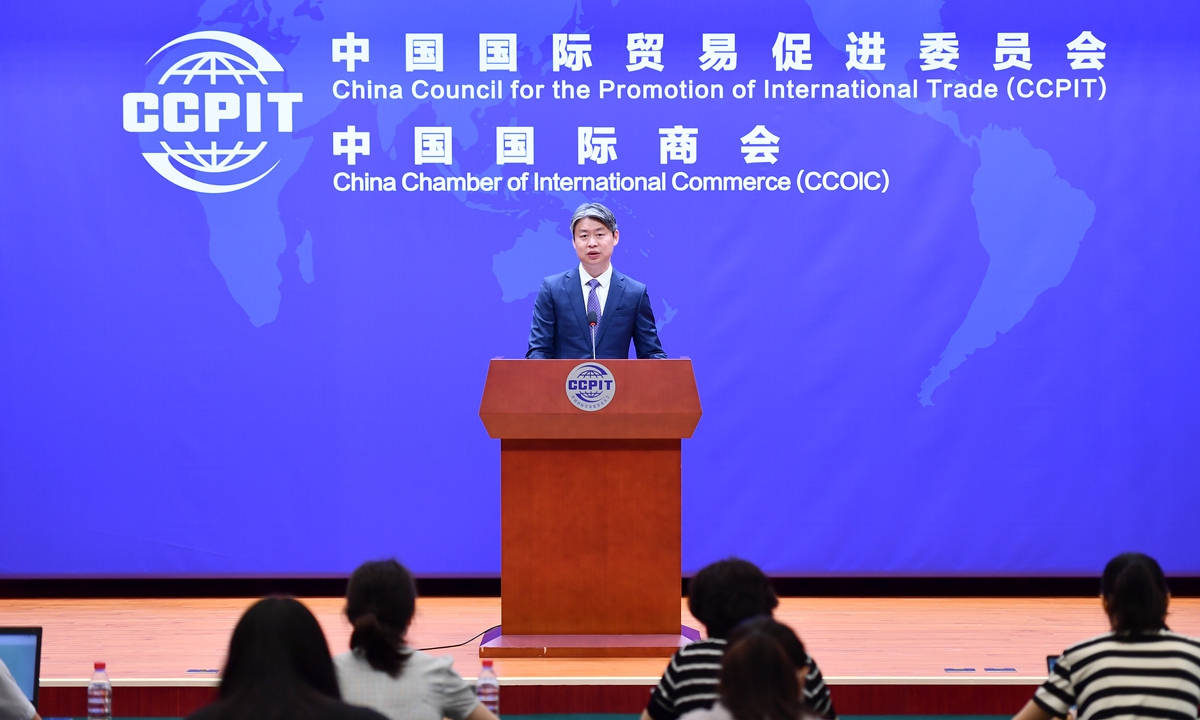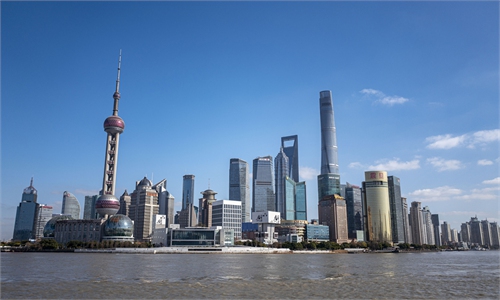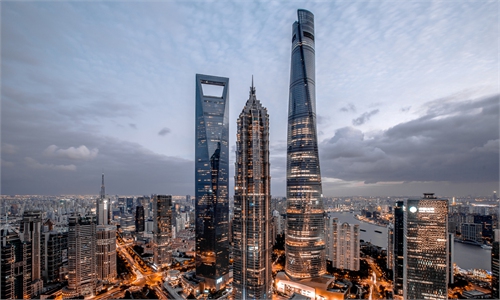Confidence survey on foreign firms in China offers strong rebuttal to ‘crackdown’ hype
Saying China’s national security efforts weaken investor confidence is deliberate malice: expert

CCPIT spokesman Sun Xiao briefs a press conference. Photo: Courtesy of CCPIT
An overwhelming number of surveyed foreign companies hold a satisfactory view of China's business environment during the second quarter, a fresh survey conducted by the China Council for the Promotion of International Trade (CCPIT) showed on Friday, confirming foreign companies' confidence and willingness to expand in the Chinese market, amid "crackdown" hypes by some foreign media outlets.
Over 90 percent of nearly 800 foreign enterprises from 26 localities in China have expressed satisfaction with China's policies concerning foreign investors since the fourth quarter of 2022, according to the survey. Over 60 percent of the respondents are small- and micro-sized companies.
Over 80 percent respondents expect that their investment yield in 2023 will remain at or improve from the 2022 levels, the survey showed, and over 90 percent of those surveyed say the attractiveness of the Chinese market remains unchanged or is rising while nearly 70 percent say they are bullish on the prospects of the Chinese market in the next five years.
The report showed that as the Chinese economy proceeds along a recovery track, foreign-invested companies are stable in their confidence in China and the overall trend of expanding investment in China remains unchanged, CCPIT spokesman Sun Xiao told a press briefing on Friday.
Observers said the steady confidence of foreign companies in the Chinese market and growing recognition of the Chinese business environment is hard-won, and came through the efforts of the Chinese government at all levels and amid the global headwinds of rising geopolitical tensions and calls in the West for "decoupling" or "de-risking."
Foreign direct investment in the Chinese mainland in actual use fell 2.7 percent in the first half of 2023, with the country having used 703.7 billion yuan ($97.4 billion) of foreign capital, vice minister of commerce Guo Tingting said on July 19. Some 24,000 new foreign-invested firms were established during the period, a surge of 35.7 percent from a year earlier, according to Guo.
Experts noted that the results are hard won, given the austere global picture, and that short-term fluctuations will not harm foreign investors' optimism about China's development prospects.
Geopolitical tensions and financial turmoil saw global transnational investment falling 12 percent in 2022, according to a report by the United Nations Conference on Trade and Development, which predicted continued downward pressure for global investment in 2023.
However, some foreign media outlets maliciously linked the situation with China's legitimate efforts to safeguard its national security, including the inspections of a number of foreign consultancy and audit firms, and China's revised counter-espionage law to what they described as weakened confidence.
Chinese analysts said this connection does not make sense, as every country in the world makes efforts to safeguard their national security. Trying to connect the two is deliberate malice and reflective of the wanton crackdown imposed by the US on Chinese firms.
"Such hypes are malicious tricks by some morbid political factions in the West to hijack China's legitimate efforts to ensure its national security," Li Yong, a senior research fellow at the China Association of International Trade, told the Global Times.
"Their aim is to stir and confuse the minds of business decision makers pondering investing in the Chinese market by touching their nerves on de-risking," Li said.
Li noted that no other markets, including the US or India, can substitute China in terms of continuously improving business environment and market size.
Data shows that the majority of foreign companies are still calm and rational when it comes to making investment choices on China, and they continue to enter the Chinese market and also have nothing to fear, as they know well that the Chinese government will respect and protect normal business activities, analysts said.
In a trip to Shanghai Free Trade Zone's Lingang Special Area, Chinese Premier Li Qiang vowed to attract more foreign enterprises to invest in China, and called for joint efforts to ensure stable industrial and supply chains, the Xinhua News Agency reported on Thursday.
Li visited Lenze Drive Systems (Shanghai) Co, a subsidiary of German firm Lenze, that specializes in automation, and Volvo Construction Equipment (China) Co, and learned details about the firms' progress in promoting intelligent manufacturing and remanufacturing.
Foreign companies and China's development are a mutually accomplishing relationship, and it is necessary to tell well the story of foreign companies' development in China, according to the premier.
MOFCOM said in a meeting on Thursday that localities should step up efforts to stabilize and increase foreign investment, and speed up the process of setting up a roundtable mechanism with foreign companies for comminicating on a regular basis and responding to companies' concerns in a timely manner.
Chinese market's size, the abundance of favorable policies and complete industrial and supply chains are the driving force behind foreign companies' decision to invest in China, according to CCPIT. Technological innovation and research and development were seen as the biggest opportunity by foreign companies for two consecutive quarters.
Bai Ming, a research fellow at the Chinese Academy of International Trade and Economic Cooperation under MOFCOM, believes there will be more policies in the second half of the year aimed at stabilizing foreign investment.
"As China pursues the path of high-quality development, it will need to foster a win-win relationship with foreign-invested companies," Bai told the Global Times.
Senior executives of global companies have been flocking to China since March this year, including Microsoft founder Bill Gates, Tesla CEO Elon Musk, Apple CEO Tim Cook and LVMH owner Bernard Arnault. Defying calls in the West for "decoupling" or "de-risking," they expressed their intent to expand investment in China.
During a meeting with Chinese Vice President Han Zheng in Beijing on Wednesday, visiting Visa Executive Chairman Al Kelly said that Visa has full confidence in its investment in China and stands ready to expand long-term cooperation with the country and contribute to bilateral economic and trade cooperation, according to the Xinhua News Agency.
As the 100-day countdown to the 6th China International Import Expo (CIIE) began on Wednesday, global executives from over 60 exhibitors have confirmed their personal attendance at the world's largest imports trade show. Dozens of foreign companies have already signed up for the 7th CIIE in advance, according to the organizer.



